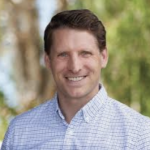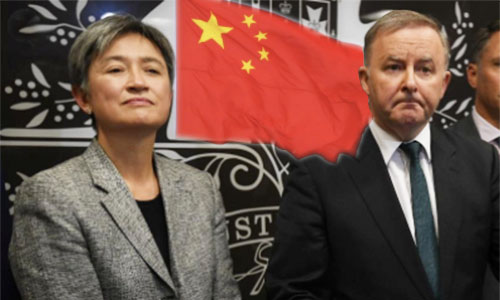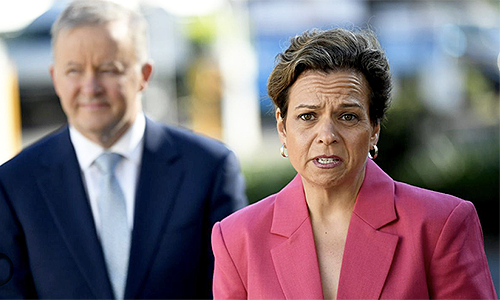
UNIVERSITY leaders should be hiding their faces in shame having diverted stretched national intelligence resources to deal with subversive threats on campus.
The chairman of Australia’s Federal Intelligence & Security Committee Andrew Hastie said ASIO’s job was to deal with the most pressing threats to the nation – not securitising universities.
“We don’t want ASIO running around on campus, that’s not their job,” the former SAS officer said.
“If universities did their jobs we wouldn’t have a lot of the problems we now have.”
COMPROMISED
He pointed to academic freedom restrictions, underhanded research collaborations, conflicts of interest and compromised intellectual property ownership as areas of interest.

Mr Hastie raised his concerns during an online address to the influential Northern Forum group this week. He specifically signalled China’s Thousand Talents Plan, which targets and recruits international scientists.
“We will be exploring research collaboration with China through our committee,” Mr Hastie said.
“We’re going to ensure we bring transparency and accountability to the university sector.
“Every single Australian taxpayer dollar that goes to the university sector must be acquitted in the national interest through the development of young minds who will go on to serve our country as economic leaders, researchers, political leaders, military leaders or what have you.”
He said his Joint Committee would also target intellectual property rights to ensure they were not lost – but instead “harvested here” to Australia’s benefit.
“What we’ve seen, I think, is some of the intellectual property that has been developed here in Australia lost to patents oversees, particularly in China.”
The public deterioration in campus culture would also be investigated.
“We want to make sure campus culture is free and that academic expression and freedom of speech is allowed,” Mr Hastie said.
CENSORED
“We’ve had too many examples recently whereby that culture of freedom has been traduced.
“There’s the story of Drew Pavlou at the University of Queensland, there’s Elaine Pearson at the University of NSW, she posted in support of the Hong Kong protesters and was censored.
“UNSW has issued an apology, but none the less these things need looking at.”
Mr Hastie said there was evidence that Australian citizens of Chinese descent were being harassed by the Chinese Government – particularly in universities.
“That’s why we introduced the Foreign Interference legislation. It’s an offence to engage diaspora groups in this country on behalf of a foreign government.”
Going forward, the Foreign Interference and Espionage Task Force would be responsible for investigating such crimes.
“We have a lot of international students, they come here for a liberal education in the Western tradition and, as we’ve seen, there’s what appears to be a culture of censorship around these geo-political questions.
“This is being looked at, it is an offence – the legislative frame work is in place and our operational elements are looking closely at this now.”
SELLING DEGREES
Mr Hastie said many universities had exposed themselves to foreign influence.
“If you transition a university from a sovereign institution where you develop young Australians to a business model where you are selling degrees into the region, something gets lost in that process,” he said.
“We’re coming at it through a foreign interference lens, but what we really want to see is greater transparency and accountability in the university sector.
“We don’t want to securitise university campuses. But it’s up to them to demonstrate that they are serious about protecting our sovereign interests and I think that’s where the challenge lies.”
He said students at Australian universities needed to take risks; to be the controversial voice in tutorials, to speak their mind and to be active in student politics even if their world view was a minority on campus.
“All of those things constitute an exercise in personal freedom and the more Australians who do that, whether at university or in the workplace – not in a provocative sense, but not shrinking away from your convictions – I think that’s really important.
“A lot of us are in a defensive crouch at the moment. There are a lot of Australians who just want to live their lives and express their views without being persecuted for them.
“Right now there’s a bit of fear about doing that, but courage is contagious.”
He said young Australians, in particular, needed to show courage, speak their mind and demonstrate the freedom of expression that makes Australia unique.PC












How should politicians engage with CCP United Front organisations ? Jonathon O’Dea is a patron of The Australia China Council for the Peaceful Reunification of China set up by expelled CCP activist Huang Xiang Mo. Phillip Ruddock used to have the same role in the same organisation. John Howard is patron of a lower profile United Front organisation. Is this bad ? Should we be accepting CCP fronts as the way to engage with the Chinese community? I imagine the answer is “it depends”, but does anyone actually know what the policy of the conservative parties is ? Have they actually thought it through and agreed on one at Federal and State level ? or are they making it up as they go along ?
Which suggests that university leadership is complicit with foreign espionage. Consequently these people are willingly exposing themselves to prosecution. So be it.
Their conformity in rejecting the Ramsay bequest for a minor undergraduate course in Western civilization, should have warned us of the insidious matters afoot.
There are so many blunders they are condoning which are undermining our country, and the worst is probably their spawning graduates brainwashed in woke, into our bureaucracies in every aspect of government.
Trust ASIO. They have the nation’s security at heart. Not universities where left wing, arm chair socialists, espouse Marxist ideas.